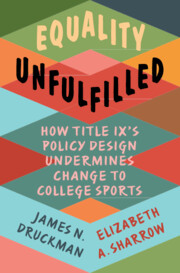Book contents
- Equality Unfulfilled
- Cambridge Studies in Gender and Politics
- Equality Unfulfilled
- Copyright page
- Dedication
- Contents
- Figures
- Tables
- Preface
- Acknowledgments
- 1 Gender Equality in College Athletics
- 2 Using Survey Data to Study Policy Support
- 3 Student-Athlete Contact and Policy Support
- 4 Organizational Culture and Policy Support
- 5 The Public, Fans, and Policy Support
- 6 Gender Equality in College Sports and Beyond
- References
- Index
3 - Student-Athlete Contact and Policy Support
Published online by Cambridge University Press: 06 July 2023
- Equality Unfulfilled
- Cambridge Studies in Gender and Politics
- Equality Unfulfilled
- Copyright page
- Dedication
- Contents
- Figures
- Tables
- Preface
- Acknowledgments
- 1 Gender Equality in College Athletics
- 2 Using Survey Data to Study Policy Support
- 3 Student-Athlete Contact and Policy Support
- 4 Organizational Culture and Policy Support
- 5 The Public, Fans, and Policy Support
- 6 Gender Equality in College Sports and Beyond
- References
- Index
Summary
This chapter focuses on the possibilities for pursuing change toward gender equity policy from the bottom up. Women are targeted beneficiaries of the gender equity initiatives (and therefore we expect their support to be relatively high); however, they comprise only 43 percent of student-athletes. Stronger majority coalitions thus require obtaining the support of male student-athletes. We theorize one route to coalitions via interpersonal contact. We build on the enormous extant literature on contact to identify conditions under which male student-athletes may become more supportive of policies for marginalized female student-athletes. These include when men understand the plight of the marginalized group (women) and when they trust the policymaking institutions (colleges and the NCAA). We argue that interpersonal contact is a mechanism by which the first condition is met. We provide clear evidence for our predictions with observational and experimental data. However, we also find that the sex-segregated institutions of college sports prevent significant contact between women and men, thereby vitiating the likelihood of such a coalition emerging to pursue change from the bottom up.
Keywords
- Type
- Chapter
- Information
- Equality UnfulfilledHow Title IX's Policy Design Undermines Change to College Sports, pp. 67 - 104Publisher: Cambridge University PressPrint publication year: 2023

